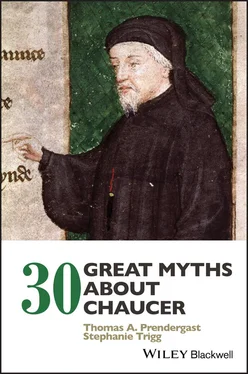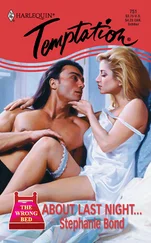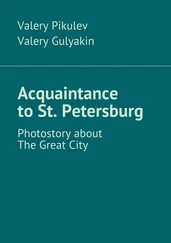O fader and founder of ornate eloquence,
Than enlumened hast alle our Bretayne,
To soone we loste thy laureate scyence.
O lusty lyquour of that fulsome fontayne! 16
Like Spenser’s “well of English undefyled,” this imagery draws on the classical tradition of Mount Parnassus, the mythic source of poetry and learning.
Similarly, in the 1532 edition of Chaucer’s works, Sir Brian Tuke also marvels how, during the medieval period, “when doubtless all good letters were laid asleep throughout the world,” nonetheless “suche an excellente poete in our tonge, shulde as it were (nature repugnyge) sprynge and aryse.” 17
Ironies abound even here, though. The idea of a poet “illuminating” a land itself comes from Chaucer, whose Clerk introduces his translation of Petrarch’s tale of Griselda (itself a translation from Boccaccio) with praise of Petrarch’s “rethorike sweete” that has “Enlumyned al Ytaille of poetrie” (IV.33–34). 18 Many of the metaphors and myths of origin we discuss in this book have at least two temporal dimensions: sometimes, as here, we look back through the past to see the shape of each myth as it has developed; in others we also try to examine the conditions that give rise to each idea about Chaucer. We consider here the myth of Chaucer’s “fatherhood” as it has been perceived and expressed by his literary “children” who claim him as forebear; in Myth 2, we will consider the reception of Chaucer in contrast to other, earlier English poets.
Was Chaucer the father of English literature? Perhaps perversely, we suggest that indeed he was, if only because so many writers have thought and written about him in this way. A literary tradition constitutes itself by choosing its own forebears, and by very selective processes of ideological and national interest. Chaucer has held this position in the scholarly and popular imaginary for so long that his position is no longer disputed, though this is not to say that the idea of literary paternity has not come under severe critique from a number of quarters. Many literary scholars over the last forty or so years have worked hard to destabilize such self‐affirming genealogies, critiquing the exclusions and ideological assumptions about the kind of poetic voice and attitudes that are normalized through precisely this sort of self‐selecting tradition. Like other white, male writers, Chaucer is subject to critiques of the canon he seems to inaugurate. If Chaucer is the father of English literature, then he should be the first place we go to in order to re‐think the kinds of literature we want to study. This book is another step in that project, as we turn to examine the origins and implications of many of our ideas about the poet that some have named “Father.”
1 1A.C. Spearing , Medieval to Renaissance in English Poetry (Cambridge: Cambridge University Press, 1985), 34, 59.
2 2“Shakespeare and Milton were the greatest sons of their country; but Chaucer was the Father of his Country, rather in the style of George Washington.” G.K. Chesterton, Chaucer (London: Faber and Faber, 1932), 15.
3 3Thomas Hoccleve , The Regiment of Princes , ed. Charles R. Blyth (Kalamazoo, MI: Medieval Institute Publications, 1999), l.1961.
4 4Ibid., l.1964.
5 5Ibid., ll.2080, 4983.
6 6Ibid., l.4978.
7 7Edmund Spenser , The Faerie Queene , ed. Thomas P. Roche Jr . (London: Penguin, 1978), IV.ii.32.
8 8Richard Baker, A Chronicle of the Kings of England (London: Printed for Daniel Frere, 1643), 45 .
9 9John Dryden , The Poems of John Dryden, vol. IV, ed. James Kinsley (Oxford: Clarendon Press, 1958), 1457.
10 10Ibid., 1452–3.
11 11Seth Lerer , Chaucer and His Readers: Imagining the Author in Late‐Medieval England (Princeton, NJ: Princeton University Press, 1993), 11.
12 12Ibid., 16.
13 13Harold Bloom , The Anxiety of Influence: A Theory of Poetry , 1973, 2nd edn. (Oxford: Oxford University Press, 1997).
14 14Spearing, Medieval to Renaissance, 108–9.
15 15Ibid., 109.
16 16J.A. Burrow , ed., Geoffrey Chaucer: A Critical Anthology (Harmondsworth: Penguin, 1969), 44.
17 17The Workes of Geffray Chaucer newly imprinted, ed. William Thynne (London, 1532), A2v.
18 18All quotations from Chaucer’s works, unless otherwise specified, are taken from The Riverside Chaucer, gen. ed. Larry D. Benson (Boston, MA: Houghton Mifflin, 1987), and are cited by fragment or book and line numbers.
Myth 2
CHAUCER WAS THE FIRST ENGLISH POET
Of all the “myths” in this book, of old or of more recent standing, this is one of the easiest to dispel. It is the other side of the coin, as it were, to Myth 1, “Chaucer is the father of English literature.” As we saw there, for better or worse, Chaucer is consistently thought of as the oldest poet to exert a benevolent but deep influence on later poetic tradition in England and by extension, on all Anglophone writing.
But was he the first poet to write in English? This is a very different question. There is one linguistic issue to clear up first, and that is what we mean by “English.” Chaucer’s language is known as “Middle English,” the language written and spoken in England between around 1100 and 1500. The phrase makes a careful distinction from “Old English,” the language spoken by the Germanic tribes who settled in England around the mid‐fifth century after the Romans had withdrawn. Most of the surviving manuscripts in Old English were written in the ninth, tenth and eleventh centuries. Many of these texts contain a mixture of Christian and pagan Germanic ideas as a result of the Christian missionary program starting in the sixth century, which had a profound influence on both religious and scribal culture.
Old English is the language of Beowulf , as well as a mixed corpus of heroic narratives, saints’ lives, sermons, letters, translations, personal lyrics and other writings. For our purposes, one of the earliest and most important fragments of poetry is preserved in a Latin text, Historia ecclesiastica gentis Anglorum , translated into modern English as The Ecclesiastical History of the English People , written by the monk Bede in 731 CE. Here Bede recounts the story of Caedmon, a cowherd, who would routinely leave gatherings when it was his turn to sing because he had no musical ability. But inspired by God in a dream, he produces a short poem in Old English, using words and expressions he has never spoken before, honoring the Creation:
Nu sculon herigean / heofonrices Weard
[Now must we praise / heaven‐kingdom’s Guardian,]
Meotodes meahte / and his modgeþanc
[the Measurer's might / and his mind‐plans,]
weorc Wuldor‐Fæder / swa he wundra gehwæs
[the work of the Glory‐Father, / when he of wonders of every one,]
ece Drihten / or onstealde
[eternal Lord, / the beginning established.]
He ærest sceop / ielda bearnum
[He first created / for men's sons]
heofon to hrofe / halig Scyppend
[heaven as a roof, / holy Creator;
ða middangeard / moncynnes Weard
[then middle‐earth / mankind's Guardian,]
ece Drihten / æfter teode
[eternal Lord / afterwards made—]
firum foldan / Frea ælmihtig.
[for men earth, / Master almighty.] 1
The language of Caedmon’s poem is substantially different from Chaucer’s Middle English, and we quote the text in its entirety, partly to give a sense of what English poetry looks like without French and Latin vocabulary, and also to show the patterns of non‐rhyming alliterating poetry, with the first stress after the mid‐line caesura often acting as the foundational alliterating syllable. The literal translation also shows the flexible word order possible when a language is more heavily inflected (for example, when variable suffixes do the work of prepositions), and when the verse form proceeds by paratactic phrases in apposition, rather than sentences structured around a controlling principal verb, as most of Chaucer’s sentences are, even in the syntax of his more complex stanzaic forms, like the seven‐line “rhyme royal” stanza. Bede’s narrative similarly draws attention to the strong oral component in Old English poetry, and again, this is closely related to its appositional form.
Читать дальше












